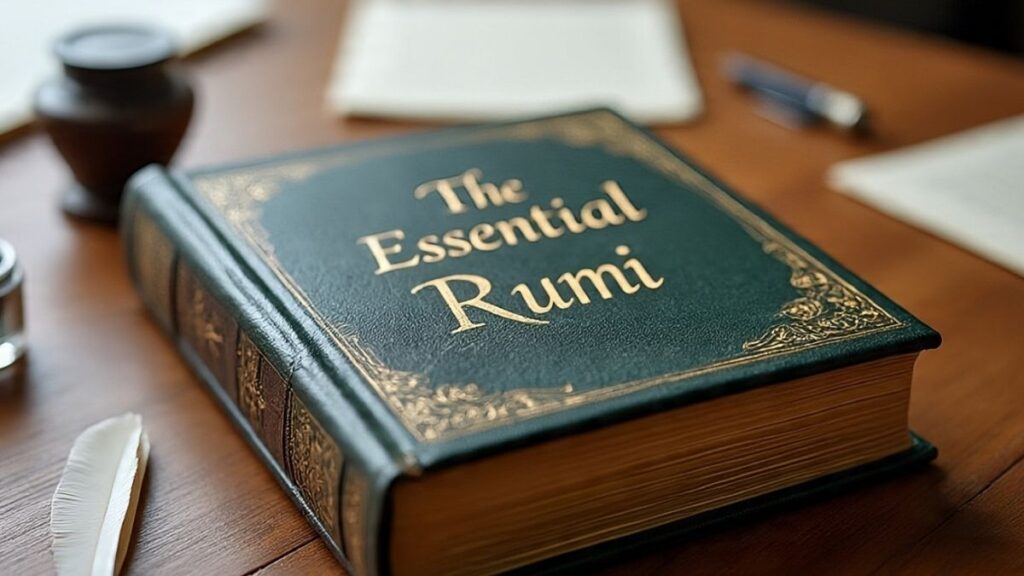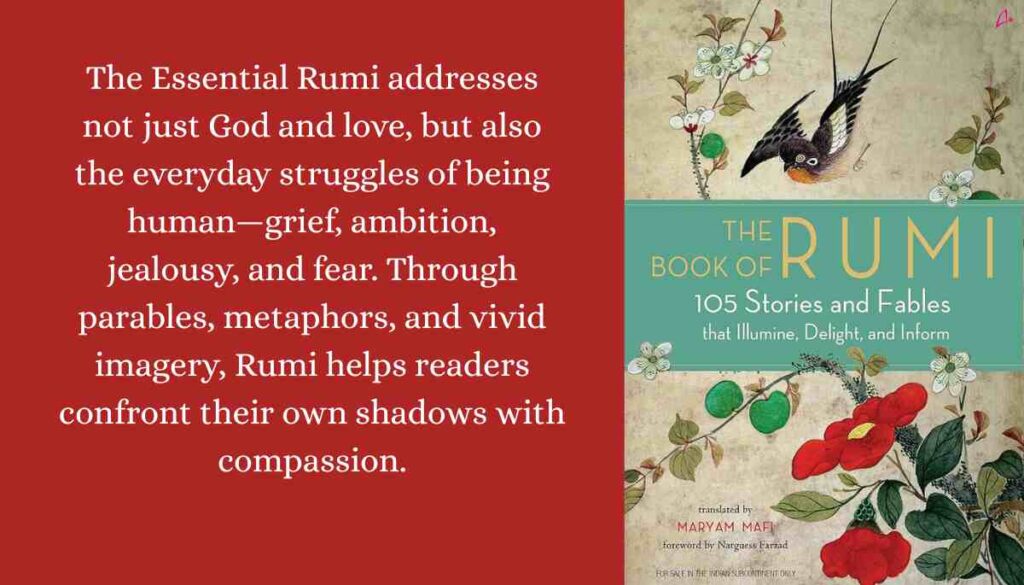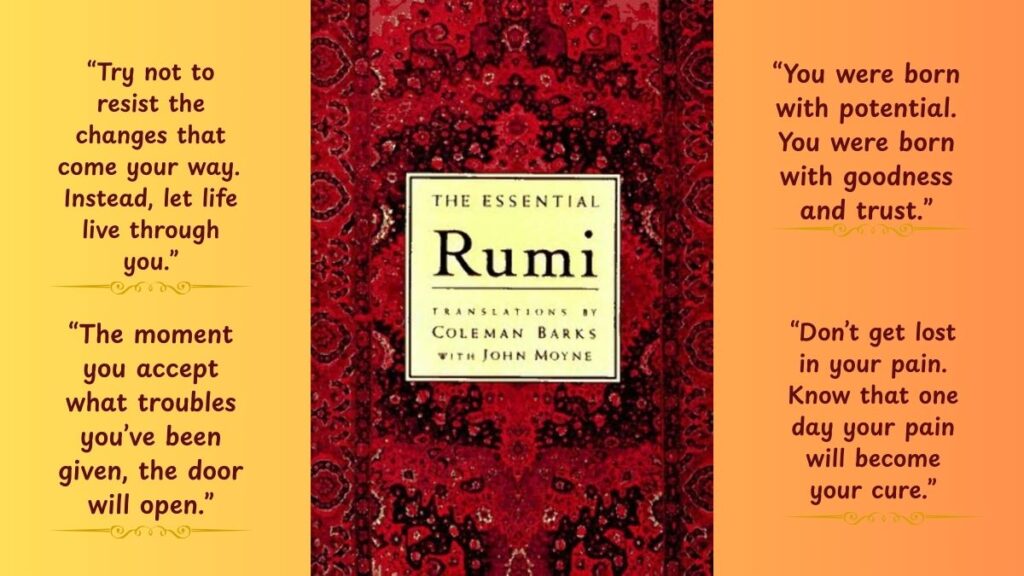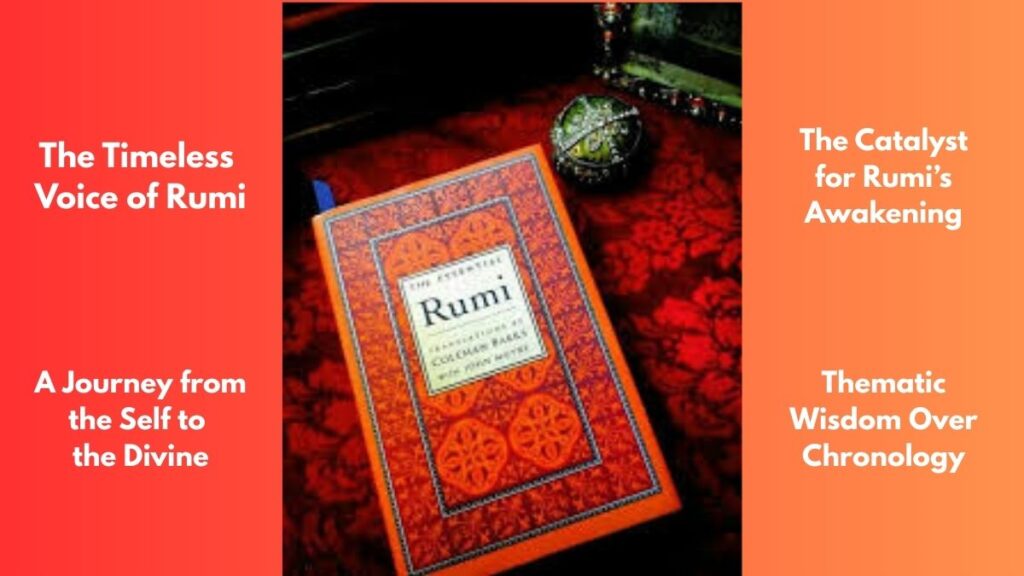
In the ever-evolving search for meaning, purpose, and spiritual connection in today’s fast-paced world, The Essential Rumi remains a guiding light—a literary and spiritual masterpiece that transcends time and space. Translated by Coleman Barks, The Essential Rumi is a compilation of the most profound poetry and philosophical insights written by the 13th-century Sufi mystic, Jalal Ad-Din Muhammad Rumi. With the rise in global interest in spirituality, mindfulness, emotional healing, and personal growth, Rumi’s work has emerged as a relevant and transformative force for people of all faiths and backgrounds.
Who was Jalaluddin Rumi?

Jalaluddin Rumi, also known simply as Rumi, was a Persian poet, theologian, and Sufi mystic born in 1207 in present-day Afghanistan. His works are a blend of spiritual longing, divine love, emotional intimacy, and transcendent wisdom. Rumi’s poetry is widely considered one of the most beautiful expressions of divine love and the human spirit’s desire to connect with something greater than itself.
Rumi’s relevance has soared in recent decades, particularly among English-speaking audiences. Thanks to the poetic rendering by Coleman Barks, The Essential Rumi presents his teachings in language that’s accessible yet deeply philosophical. The book is not just a poetry collection; it’s a spiritual guide that covers themes like love, loss, surrender, ego, divine union, separation, silence, joy, and enlightenment.
Introduction: The Timeless Voice of Rumi
Jalal ad-Din Muhammad Rumi, widely known simply as Rumi, remains one of the most influential and beloved mystical poets in human history. His words, written in the 13th century, continue to echo with power and relevance across the world. “The Essential Rumi,” translated by the celebrated Coleman Barks, distills Rumi’s spiritual and poetic wisdom into a curated selection of verses that transcend the boundaries of time, religion, and culture. These translations are not literal in the traditional academic sense, but they capture the essence—the soul—of Rumi’s mystical experience.
Rumi’s Approach to Spirituality: A Journey from the Self to the Divine
Unlike dogmatic or scholarly spiritual writings, Rumi’s poetry pulses with raw, universal emotion. His verses are less about doctrines and more about discovering the sacred within the everyday. One of Rumi’s central themes is that of the soul’s yearning for union with the divine—a mystical experience often symbolized by wine, music, the beloved, and the tavern.
Among Rumi’s most quoted lines is, “You were born with wings, why prefer to crawl through life?” This message underpins much of the collection: humans are divine in essence, and our task is to remember that truth. This theme is explored across many sections of “The Essential Rumi,” where spiritual love is likened to burning, intoxication, and even madness. Rumi says, “Lose yourself completely, return to the root of the root of your own soul.”

The Influence of Shams of Tabriz: The Catalyst for Rumi’s Awakening
A significant figure in Rumi’s poetic transformation is Shams of Tabriz, a mystic who became Rumi’s spiritual companion. Their relationship transcended conventional friendship; it was an intense merging of souls. Shams’ sudden disappearance (possibly a murder) triggered Rumi’s outpouring of divine longing through poetry. Many of the love poems in this collection are addressed to Shams, not as a person but as a divine mirror.
In poems that mention Shams, Rumi often writes in ecstasy. He breaks traditional narrative structure, allowing free-flowing metaphors to guide the reader. “Don’t grieve. Anything you lose comes round in another form,” he says. This is both a spiritual truth and a personal consolation after losing his beloved Shams.
Structure of the Book: Thematic Wisdom Over Chronology
Each section begins with a short meditation by Barks, giving context without limiting interpretation. He doesn’t overanalyze or reduce the mysticism; rather, he invites the reader to “feel” the poems rather than intellectually dissect them. This structure allows the book to act as both spiritual guidance and poetic art.
Love and Longing: Rumi’s Universal Language
Rumi believed that love was the essential force of the universe. Whether speaking of divine love, human affection, or the spiritual bond between souls, his verses emphasize that all forms of love originate from the same source. One of his most famous quotes reads: “Gamble everything for love, if you’re a true human being.”
This love is not passive. It is burning, yearning, aching, and transformative. Rumi compares it to a fire that purifies the heart, a wind that shakes the ego loose, and a dance that liberates the soul from the cage of fear.
Metaphors and Symbolism: Dancing Beyond Literal Meaning
Rumi’s poetry is rich in metaphor. He uses wine to represent divine intoxication, the tavern as the mystical gathering place, the reed flute as the soul’s longing, and fire as the passion of enlightenment. For example:
“Dance, when you’re broken open. Dance, if you’ve torn the bandage off. Dance in the middle of the fighting. Dance in your blood. Dance when you’re perfectly free.”
These metaphors are not mere poetic devices—they are spiritual keys. In Sufi tradition, metaphor is the language of the soul, and Rumi speaks it fluently. He takes common, physical experiences and uses them to reflect cosmic truths.
The Presence of Sacred Figures: Jesus, Moses, and Prophet Muhammad (PBUH)

Rumi’s spiritual canvas is inclusive. His poetry references religious figures not to argue theology but to highlight spiritual insight. Jesus represents unconditional love, Moses the search for God, and Muhammad the model of divine submission.
Though Rumi was a devout Muslim, his spirituality is not confined to a single tradition. As he famously said, “I belong to no religion. My religion is love. Every heart is my temple.”
Poems as Advice: Life Lessons from Rumi
One of the most profound qualities of “The Essential Rumi” is how accessible and actionable the advice feels. Rumi writes, “Give up wanting what other people have. That way you’re safe.” Or, “The wound is the place where the Light enters you.”
These lines are practical spiritual tools—brief, memorable, and powerful. They remind the reader that Rumi’s aim was not only transcendence but transformation.
Joy and Playfulness: The Laughter of the Divine

Though many view Rumi’s poetry as solemn or mystical, much of it is playful. He jokes, teases, and even flirts with the reader. His spirituality includes laughter and delight.
For instance, he writes: “Why do you stay in prison, when the door is so wide open?” or “Try not to resist the changes that come your way. Instead, let life live through you.” These are delivered with lightness, inviting introspection without severity.
Sexuality and Sensuality: Embracing the Physical as Sacred
Unlike many religious thinkers who view the body as a limitation, Rumi integrates the sensual with the spiritual. His erotic poems are not merely romantic but are metaphors for the soul’s union with God. The language may feel intimate, but it aims for the eternal.
The Essential Rumi Conclusion: Why Rumi Still Matters Today
In a world saturated with noise, ego, division, and fear, Rumi’s voice cuts through like a bell in a storm. His poetry reminds us of our divine origin and destiny. It invites us to be more human, more vulnerable, more real.
As he writes:
“Don’t get lost in your pain, know that one day your pain will become your cure.”
“We have fallen into the place where everything is music.”
Whether you’re a seeker of spiritual truths, a lover of poetry, or someone simply looking for solace, The Essential Rumi is a lifelong companion.
The Essential Rumi: The Spiritual Meaning of Rumi’s Poetry
At the heart of The Essential Rumi lies a profound spiritual message: that our earthly experiences are simply veils covering the divine reality. Every human being carries within them a spark of the divine, and through love, awareness, and inner silence, this spark can be nurtured and allowed to shine.
Rumi’s poems challenge readers to “die before you die,” a metaphor for shedding the ego, letting go of material attachments, and embracing spiritual rebirth. This notion is central to Sufi mysticism, where the ego is considered the main barrier between man and God. Rumi’s poetic expressions speak to the soul’s journey back to its origin, urging readers to “come, whoever you are,” and partake in the dance of divine ecstasy.
A central quote from The Essential Rumi that encapsulates this is:
“The wound is the place where the Light enters you.”
This speaks not only to spiritual seekers but also to anyone who has suffered emotionally and is searching for healing, self-awareness, and transformation.
The Essential Rumi: Quotes About Love and Life, Echoes of Divine Passion
One of the reasons Rumi’s poetry has endured across centuries is his celebration of love—not merely romantic love, but divine love or ishq-e-haqiqi. Rumi writes as if intoxicated with the presence of the Beloved, the eternal One, who manifests in all aspects of life and nature.
In this line, Rumi reminds us that love is not found externally, but discovered inwardly—it’s a reflection of our connection to the divine source. His poems echo that all human experiences of passion and heartbreak are metaphors for our separation and eventual reunion with God.
Rumi’s love is ecstatic. It is burning, transformative, and all-encompassing. When he says:
“You were born with wings, why prefer to crawl through life?”
—he’s not offering motivational advice, but challenging readers to awaken to their spiritual potential, to soar with the wings of consciousness rather than trudge through a materialistic existence.
The Role of Shams in Rumi’s Spiritual Awakening

One cannot understand Rumi’s transformation without knowing about Shams of Tabriz. Shams was a wandering dervish who deeply influenced Rumi’s life. Their companionship led to an intense spiritual awakening for Rumi, eventually inspiring the thousands of verses of poetry we read today.
Rumi’s bond with Shams is both controversial and sacred. It transcended the boundaries of friendship and moved into the realm of divine union. Shams was the mirror in which Rumi saw God, and his eventual disappearance caused Rumi to retreat inward and channel his longing through poetry.
This relationship has spawned countless spiritual reflections, especially within the context of:
- Divine friendship in Sufism
- Rumi and Shams’ spiritual relationship
- The story of Rumi’s transformation through Shams
The Universal Nature of Rumi’s Teachings
Though rooted in Islamic mysticism, The Essential Rumi transcends religious boundaries. His messages resonate with Christians, Buddhists, Hindus, agnostics, and atheists alike. Why? Because Rumi speaks the universal language of the heart. His poetry doesn’t impose beliefs—it invites introspection.
Some poems mention Biblical figures like Jesus and Moses alongside Prophet Mohammad, showcasing Rumi’s appreciation for divine wisdom in all its manifestations. For instance:
“The lamps are different, but the light is the same.”
This statement beautifully conveys religious pluralism and speaks directly to contemporary audiences seeking interfaith harmony.
The Art of Living: Rumi’s Philosophy on the Human Condition

The Essential Rumi addresses not just God and love, but also the everyday struggles of being human—grief, ambition, jealousy, and fear. Through parables, metaphors, and vivid imagery, Rumi helps readers confront their own shadows with compassion.
Silence, Stillness, and Surrender: Rumi’s Path to Enlightenment
One of Rumi’s most recurring themes is the power of silence. In the noise of the modern world, this message is more relevant than ever. Rumi believed that true wisdom emerges not from constant speaking or thinking, but from inward listening.
“Silence is the language of God. All else is poor translation.”
In the practice of Sufism, whirling (as seen in the Whirling Dervishes) is not just dance—it is meditation in motion. Similarly, silence is not absence—it is divine presence. Rumi teaches us that the space between words is where God resides.
The Essential Rumi: How The Essential Rumi Impacts Today’s World
Coleman Barks’ translation is not merely poetic; it’s spiritually potent. It has introduced Rumi to modern audiences through accessible English and metaphors that remain timeless. Each section of the book brings to life motifs that resonate with today’s personal development movements:
- The art of letting go
- The spiritual power of vulnerability
- Finding God in daily life
- Surrendering the ego to attain higher consciousness
Rumi’s poetry is used in wellness circles, spiritual retreats, therapy, relationship coaching, and even corporate mindfulness programs. His words have become cultural currency, offering wisdom in a world starving for meaning.
The Essential Rumi: Famous Rumi Quotes to Remember and Reflect
Here are a few powerful and attractive quotes by Rumi that capture the essence of The Essential Rumi:
- “Try not to resist the changes that come your way. Instead, let life live through you.”
- “You were born with potential. You were born with goodness and trust.”
- “Be like a tree and let the dead leaves drop.”
- “Don’t get lost in your pain. Know that one day your pain will become your cure.”
- “The moment you accept what troubles you’ve been given, the door will open.”
The Essential Rumi: The Modern Relevance of Rumi’s Sufi Mysticism
Rumi’s Sufi approach teaches us that the path to God is through love—not fear, not rigid practice, not judgment. In an age of religious polarization, Rumi offers a third way: connection through the heart.
His work is referenced across various fields, including psychotherapy, meditation programs, spiritual YouTube channels, and high-traffic search queries related to “soul purpose” and “inner awakening.”
Final Thoughts: Why The Essential Rumi Is a Spiritual Masterpiece
The Essential Rumi is not just a book of poetry—it’s a spiritual journey. Jalaluddin Rumi, through the voice of Coleman Barks, invites us to awaken, to dance, to let go, and to remember that divine beauty lies not in dogma but in direct experience.
Whether you’re seeking to heal your heart, deepen your spiritual practice, or simply appreciate the beauty of language and metaphor, Rumi’s verses serve as both a mirror and a guide.
“We are not a drop in the ocean. We are the entire ocean in a drop.”
Note: All information and images used in this content are sourced from Google. They are used here for informational and illustrative purposes only.
Frequently Asked Questions about The Essential Rumi

Q1: Who was Jalaluddin Rumi?
Jalaluddin Rumi was a 13th-century Persian poet, theologian, and Sufi mystic whose poetry explores divine love, spirituality, and human connection to the divine.
Q2: What is The Essential Rumi?
The Essential Rumi, translated by Coleman Barks, is a collection of Rumi’s most profound poems focusing on love, spirituality, inner transformation, and divine union.
Q3: Why is Rumi’s work still popular today?
Rumi’s poetry remains relevant because it speaks to universal human emotions—love, grief, joy, and spiritual longing—resonating across cultures and religions.
Q4: How did Shams of Tabriz influence Rumi’s poetry?
Shams of Tabriz was Rumi’s spiritual companion whose disappearance deeply affected him, inspiring much of the passionate and mystical poetry he wrote.
Q5: What themes does The Essential Rumi explore?
The book covers themes like divine love, surrender, enlightenment, inner peace, emotional healing, joy, and the human connection to the sacred.
Q6: Is The Essential Rumi suitable for beginners in spirituality?
Yes. Coleman Barks’ translation makes Rumi’s poetry accessible to modern readers while preserving its spiritual depth and timeless wisdom.
Q7: What role do metaphors play in Rumi’s poetry?
Rumi uses metaphors like wine, fire, music, and dance to symbolize divine love, spiritual ecstasy, and the soul’s journey toward enlightenment.
Q8: How does Rumi’s poetry relate to modern mindfulness practices?
Rumi’s teachings on silence, surrender, and presence align closely with modern mindfulness, meditation, and emotional healing practices.
Q9: Is Rumi’s message tied to a specific religion?
While rooted in Sufi Islam, Rumi’s message transcends religion. He emphasizes love, unity, and the divine connection present in all human beings.
Q10: Why should I read The Essential Rumi today?
The book offers timeless wisdom, spiritual comfort, and poetic beauty, making it a valuable companion for anyone seeking inner peace or deeper meaning.







Leave a Reply